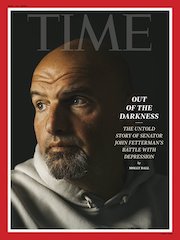
July 20, 2023
 Jack Gruber/USA TODAY NETWORK
Jack Gruber/USA TODAY NETWORK
In a 'Time Magazine' cover story, U.S. Sen. John Fetterman discussed his stroke recovery, decision to debate Mehmet Oz, battles with depression and efforts to combat mental health stigmas.
Sen. John Fetterman has faced two major health scares – and quite a bit of public scrutiny – over the last 14 months.
In May 2022, just days before the Pennsylvania primary, Fetterman had a stroke caused by a blood clot that blocked a blood vessel to his brain. The Democrat underwent surgery on Election Day to have a pacemaker implanted and then spent months recovering, mostly away from the campaign trail.
When he stepped back into the spotlight, for a debate with Republican candidate Mehmet Oz, Fetterman showed the lingering effects of his stroke, including auditory struggles and difficulties processing words and delivering sentences properly. His performance prompted questions about his abilities to serve as a U.S. senator, but he won the election by a 5-point margin.
In February, Fetterman, 53, sought inpatient treatment for clinical depression upon the recommendation of Congress's attending physician, Dr. Brian Monahan. Fetterman, who previously had battled bouts of depression, had become disillusioned in the weeks after his election. He spent six weeks in treatment before returning to work in mid-April.
Fetterman discussed these experiences at length for a "Time Magazine" cover story, published Thursday. The story, written by Molly Ball, details his stroke recovery, decision to debate Oz, battles with depression and efforts to combat mental health stigmas.
Here are three takeaways:
Fetterman had been battling depression for months before he checked into Walter Reed National Military Medical Center in February. In the weeks after his election victory, Fetterman said he felt disillusioned and struggled to get out of bed, including for family functions – signs of depression.
At Thanksgiving, he briefly came to the table to eat, but skipped the tradition of watching "Planes, Trains, and Automobiles" with his wife, Gisele, and their three children. At Christmas, he let Gisele play Santa. Fetterman said his children were confused by his behavior, expecting him to feel excited that he was headed to Congress.
A Time Magazine cover story details Sen. John Fetterman's recovery from a stroke in May 2022 and his battle with depression.
Fetterman said his depression was ignited by the combination of his natural melancholy, an intense campaign and his stroke. The story notes that the physical and psychological effects of strokes often contribute to depression.
"I didn't think I could be fixed," Fetterman told Time. "If the doctor said, oh, by the way, you have six months left, I would have been like, OK, whatever.' That's how bleak it was." He said he did not actively contemplate suicide, but feels fortunate to be alive.
Fetterman was struggling to function when he entered Walter Reed. He stopped showering and shaving his head, and his fingernails went untrimmed. He had diminished hearing, among other issues caused by his stroke. And he was full of self-loathing, believing that his family didn't want to be around him.
For a period, Fetterman refused to see his family because he felt he had failed as a father. But a therapist helped him see differently, telling him that children need hugs from their fathers. That proved to be a turning point in his battle with depression.
Fetterman's doctors also adjusted his medications, and he began to show more signs of life, displaying more emotion and regaining his sense of humor. He also began to sleep better.
Fetterman said that he hopes his story will reduce the stigma about seeking help for depression and other mental health illnesses – especially for people who work in politics.
"My message is, I don't care if you're a Trumper, MAGA, or hard leftist, or anyone in between," Fetterman said. "Depression comes across the spectrum, and get help with it. It's not a Democratic senator from Pennsylvania saying this. No. I'm just a husband and a father, somebody that was suffering from depression and got help … before it was too late. ... And I would implore anybody to get help because it can work. It worked. And I'm so grateful."
Another turning point in Fetterman's journey was reading the book "Understanding Depression" by Dr. Raymond DePaulo. The book provides a guideline on what doctors and researchers know about depression and how it can be treated. DePaulo, a professor of psychiatry and behavioral sciences at Johns Hopkins University, illustrates how to diagnose the condition and outlines various forms of treatment, including medicine, psychotherapy, support groups and exercise.
Fetterman became so enthralled with the book that he made notes and highlighted pages. Gisele had given him a copy of the book years before his hospitalization, but he had never read it.
Prior to reading the book, Fetterman had struggled to understand that his depression was the result of brain chemistry; he had viewed it as sadness. Fetterman began going outside more often, and his energy and activity increased after several weeks of medication adjustment.
Fetterman's doctors told Time that his depression is in remission and that his prognosis will remain good so long as he continues to take his medication.
"Like, you know, when I was getting out, I didn't think, 'Woo-hoo! I'm on top of the world," Fetterman said. "But, like, you have a life to live, and you're excited to live those – that life. And knock on wood, every day has been wonderful. And now I have a duty to pay it forward. Because I'll be honest with you, I would be scared where I would be right now if I didn't have the kind of help that I got at Walter Reed. And it's a shame that those types of resources are not available to everyone. But what is available is that I have a duty to be a champion of that."
 Greg Kahn/Time Magazine
Greg Kahn/Time Magazine